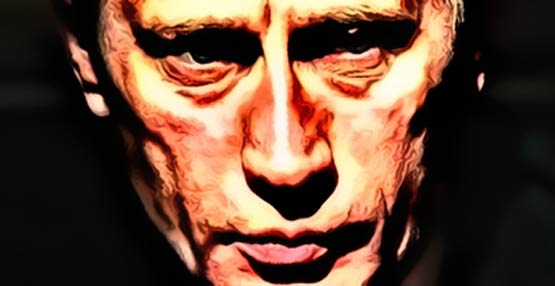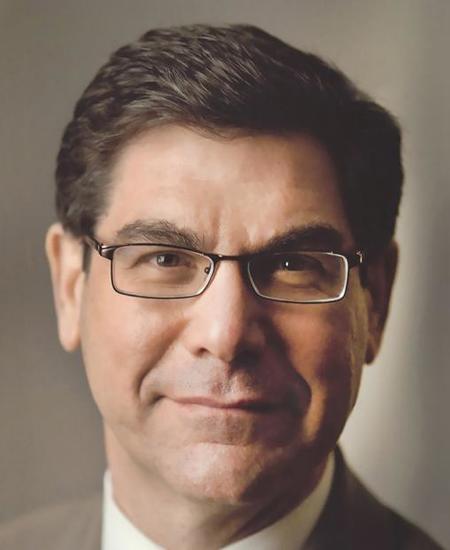
Putin dropped a pretense he'd maintained for months: That a Russian invasion of Ukraine wasn't imminent. He recognized the independence of two Moscow-backed separatist territories and ordered his troops into the region, while menacingly suggesting he might not stop there.
Putin's address to the nation on Monday harped on Ukraine's always long-shot hopes to join NATO. But it noticeably wasn't his main gripe - exposing NATO expansion as something of a red herring flopping over far more personal grievances.
Like a victim in a breakthrough therapy session, the Russian leader opened up on national television, blaming a litany of culprits for his decision to lash out. He bitterly blamed the West. "You didn't have to make an enemy of us," he said.
But this wasn't just about Uncle Sam.
Putin, it appears, has daddy issues.
He blamed patriarchs of the Soviet Union - Vladimir Lenin and Joseph Stalin - for effectively allowing the creation of Ukraine, a place he described as a manufactured state that was an "inalienable part of [Russia's] history, culture and spiritual space." He blamed Nikita Khrushchev for gifting parts of Russia to this artificial nation. He seemed to blame Mikhail Gorbachev for permitting Ukrainian statehood as the Soviet Union slouched toward collapse.
And he blamed the Ukrainians themselves for turning on their parent - Mother Russia - and suggested they would for pay for their transgressions.
"Today the 'grateful progeny' has overturned monuments to Lenin in Ukraine. They call it decommunization," Putin said. "You want decommunization? Very well, this suits us just fine. But why stop halfway? We are ready to show what real decommunizations would mean for Ukraine."
Putin has built a dark empire on misinformation, both at home and abroad. As startling as it sounded coming from his own mouth, his rewriting of Ukrainian history on Monday echoed a 5,000-word treatise he penned last July. His speech was almost certainly designed at least in part as propagandistic spin to gird the Russian people for his adventure in Ukraine.
But if he knew his truth to be lies, those watching him saw an Oscar-worthy performance. Most worrying, observers said, was the way he seemed to buy into his own narrative of the Ukrainian nation as a purely Russian invention. We made you, he seemed to say, and we can break you, too.
"It's not just geopolitics, he literally believes this stuff," Paul Stronski, a Russia expert at the Carnegie Endowment for International Peace, told me. "I think it's very troubling, and indicative of him being far removed from reality, isolated and with a chip on his shoulder not just about the West, but about the Soviet collapse. He's isolated himself from the Western-style bureaucratic economists he used to surround himself with. He's surrounded more now by nationalists and security sector folks, and it's become worse since the pandemic."
Culturally and linguistically, Ukraine and Russia share much. But as the New York Times outlined, Putin's claims of Ukraine as a mere extension of Russia don't match historical fact. "Parts of modern-day Ukraine did indeed reside for centuries within the Russian empire. But other parts in the west fell under the jurisdiction of the Austro-Hungarian empire, Poland or Lithuania," the Times noted.
"Putin's argument today that Ukraine is historically subsumed by Russia is just not right," Cliff Kupchan, chairman of the Eurasia Group, a political risk consulting organization, told the Times. The themes of Putin's speech were not new. But, Kupchan added, "the breadth and vehemence with which he went after all things Ukrainian was remarkable."
Putin seemed to betray a worldview that scorns democratic principles and honors the will of strongmen by utterly dismissing Ukraine's 1991 referendum, approved by more than 92 percent of the population, that backed its independence from the Soviet Union. He waved away the notion of the will of voters as a Western fashion, anathema to the Russian sphere of influence.
"It should be noted that Ukraine actually never had stable traditions of real statehood," Putin railed Monday. "And, therefore, in 1991 it opted for mindlessly emulating foreign models, which have no relation to history or Ukrainian realities."
The Washington Post's Robyn Dixon has outlined Putin's vision of the Ukraine crisis as a time machine to replay the Cold War with a new ending that protects Moscow's sphere of influence and maintains an outsize projection of Russian power. After Putin's long essay last summer extolling the "historical unity" of Russia and Ukraine as "one people," Ukraine's president, Volodymyr Zelensky, retorted that fraternal relations between the two nations were "more like Cain and Abel."
Putin on Tuesday appeared to reassure other former Soviet republics - which now include NATO members - that they would not be next in Moscow's firing line. Ukraine was different, he argued, because it had fallen under "foreign control."
Yet some fear Putin's extraordinary speech presages more aggressive tactics ahead. Ian Kelly, former U.S. ambassador to Georgia, told Fox News that the Russian leader's most worrying suggestion was that it was a mistake for the Soviet Union to grant statehood to its former republics.
"I think the most disturbing line of that speech was suggesting that the breakup of the Soviet Union into 15 independent states was illegitimate," he said. "And that calls into question, in his mind, the status and sovereignty of three NATO members, the three Baltic states - Lithuania, Latvia and Estonia. . . . I don't expect he will try to pick a fight with NATO, but this speech was way over the top."
(COMMENT, BELOW)
Anthony Faiola is a columnist on The Post’s foreign desk, where he is interim anchor of the Today's WorldView newsletter and column. He has stepped away from his role as South America/Caribbean bureau chief through April 2022. Since joining the paper in 1994, he has served as bureau chief in Berlin, London, Tokyo, Buenos Aires and New York.


 Contact The Editor
Contact The Editor
 Articles By This Author
Articles By This Author